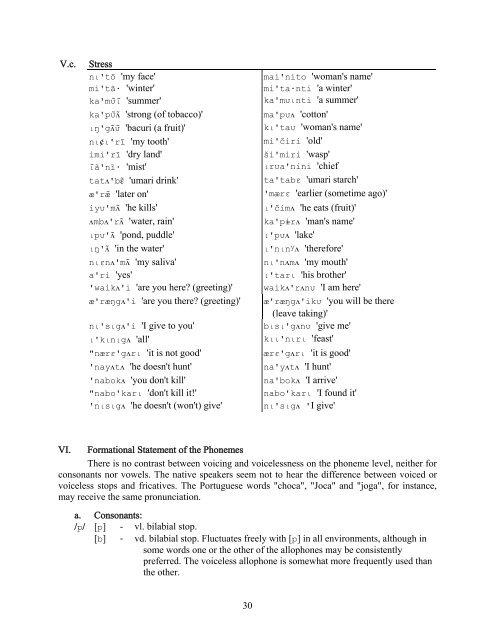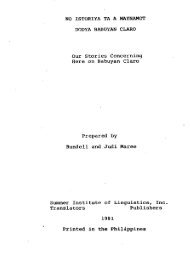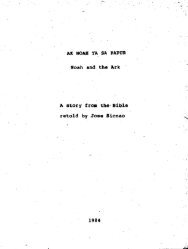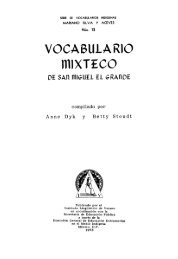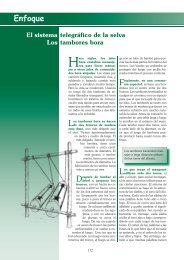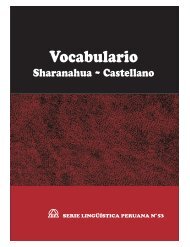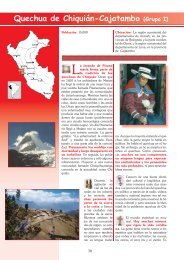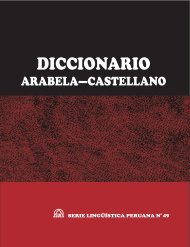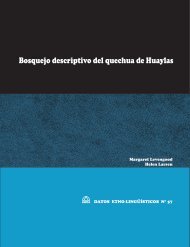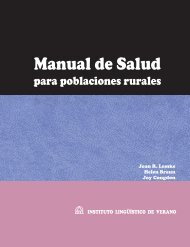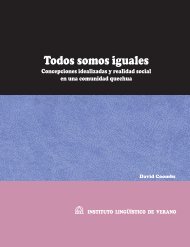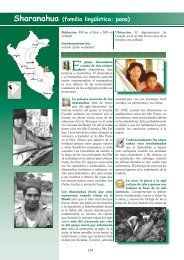A Phonemic Analysis of the Apurinã Language
A Phonemic Analysis of the Apurinã Language
A Phonemic Analysis of the Apurinã Language
Create successful ePaper yourself
Turn your PDF publications into a flip-book with our unique Google optimized e-Paper software.
V.c.Stressnι'tõ 'my face'mai'nito 'woman's name'mi'tã· 'winter'mi'ta·nti 'a winter'ka'mυ̃ι̃ 'summer'ka'mυιnti 'a summer'ka'pυ̃ʌ̃ 'strong (<strong>of</strong> tobacco)'ma'pυʌ 'cotton'ιŋ'gʌ̃υ̃ 'bacuri (a fruit)'kι'taυ 'woman's name'nιȼι'rĩ 'my tooth'mi'čiri 'old'imi'rĩ 'dry land'ši'miri 'wasp'ι̃ã'nĩ· 'mist'ιrυa'nini 'chieftatʌ'bɛ̃ 'umari drink'ta'tabε 'umari starch'æ'ræ̃ 'later on''mærε 'earlier (sometime ago)'iyυ'mʌ̃ 'he kills'ι'čimʌ 'he eats (fruit)'ʌmbʌ'rʌ̃ 'water, rain' ka'pi̶̵rʌ 'man's name'ιpυ'ʌ̃ 'pond, puddle'ι'pυʌ 'lake'ιŋ'ʌ̃ 'in <strong>the</strong> water'ι'nιn y ʌ '<strong>the</strong>refore'nιεnʌ'mʌ̃ 'my saliva'nι'nʌmʌ 'my mouth'a'ri 'yes'ι'tarι 'his bro<strong>the</strong>r''waikʌ'i 'are you here? (greeting)' waikʌ'rʌnυ 'I am here'æ'ræŋgʌ'i 'are you <strong>the</strong>re? (greeting)' æ'ræŋgʌ'ikυ 'you will be <strong>the</strong>re(leave taking)'nι'sιgʌ'i 'I give to you'bιsι'gʌnυ 'give me'ι'kιnιgʌ 'all'kιι'nιrι 'feast'"nærε'gʌrι 'it is not good'ærε'gʌrι 'it is good''nayʌtʌ 'he doesn't hunt'na'yʌtʌ 'I hunt''nabokʌ 'you don't kill'na'bokʌ 'I arrive'"nabo'karι 'don't kill it!'nabo'karι 'I found it''nιsιgʌ 'he doesn't (won't) give' nι'sιgʌ 'I give'VI. Formational Statement <strong>of</strong> <strong>the</strong> PhonemesThere is no contrast between voicing and voicelessness on <strong>the</strong> phoneme level, nei<strong>the</strong>r forconsonants nor vowels. The native speakers seem not to hear <strong>the</strong> difference between voiced orvoiceless stops and fricatives. The Portuguese words "choca", "Joca" and "joga", for instance,may receive <strong>the</strong> same pronunciation.a. Consonants:/p/ [p] - vl. bilabial stop.[b] - vd. bilabial stop. Fluctuates freely with [p] in all environments, although insome words one or <strong>the</strong> o<strong>the</strong>r <strong>of</strong> <strong>the</strong> allophones may be consistentlypreferred. The voiceless allophone is somewhat more frequently used than<strong>the</strong> o<strong>the</strong>r.30


